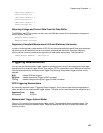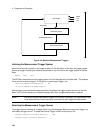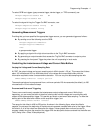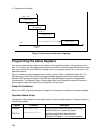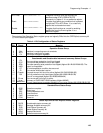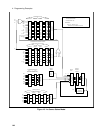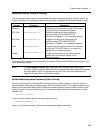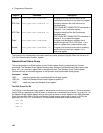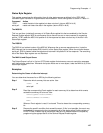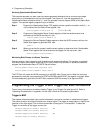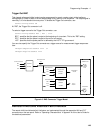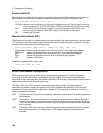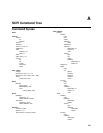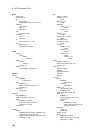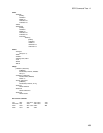Programming Examples - 4
147
Status Byte Register
This register summarizes the information from all other status groups as defined in the
IEEE 488.2
Standard Digital Interface for Programmable Instrumentation
. The bit configuration is shown in Table 4-1.
Command Action
*STB? - reads the data in the register but does not clear it (returns MSS in bit 6)
serial poll - reads and clears the data in the register (returns RQS in bit 6)
The MSS Bit
This is a real-time (unlatched) summary of all Status Byte register bits that are enabled by the Service
Request Enable register. MSS is set whenever the ac source has one or more reasons for requesting
service. *STB? reads the MSS in bit position 6 of the response but does not clear any of the bits in the
Status Byte register.
The RQS Bit
The RQS bit is a latched version of the MSS bit. Whenever the ac source requests service, it sets the
SRQ interrupt line true and latches RQS into bit 6 of the Status Byte register. When the controller does a
serial poll, RQS is cleared inside the register and returned in bit position 6 of the response. The remaining
bits of the Status Byte register are not disturbed.
The MAV bit and Output Queue
The Output Queue is a first-in, first-out (FIFO) data register that stores ac source-to-controller messages
until the controller reads them. Whenever the queue holds one or more bytes, it sets the MAV bit (4) of the
Status Byte register.
Examples
Determining the Cause of a Service Interrupt
You can determine the cause for an SRQ by the following actions:
Step 1
Determine which summary bits are active. Use:
*STB? or
serial poll
Step 2
Read the corresponding Event register for each summary bit to determine which events
caused the summary bit to be set. Use:
STATus:QUEStionable:EVENt?
STATus:OPERation:EVENt?
ESR?
When an Event register is read, it is cleared. This also clears the corresponding summary
bit.
Step 3
Remove the specific condition that caused the event. If this is not possible, the event may
be disabled by programming the corresponding bit of the status group Enable register or
NTR|PTR filter. A faster way to prevent the interrupt is to disable the service request by
programming the appropriate bit of the Service Request Enable register.



